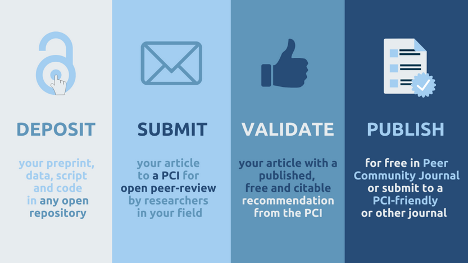ArcheoFOSS 2022
Peer Community In Archaeology: A community-driven free and transparent system for preprints peer-reviewing
Alain Queffelec
UMR5199 CNRS PACEA, Univ. Bordeaux, Ministère de la Culture, France
Marta Arzarello
Sezione di Scienze Preistoriche e Antropologiche, Univ. Ferrara, Italy.
Ruth Blasco
Institut Català de Paleoecologia Humana i Evolució Social (IPHES-CERCA), Spain; Departament d’Història i Història de l’Art, Univ. Rovira i Virgili, Spain
Otis Crandell
Centro de Estudios e Pesquisas Arquealogicas, Univ. Federal do Parana, Brazil
Luc Doyon
UMR5199 CNRS PACEA, Univ. Bordeaux, Ministère de la Culture, France; Institute of Cultural Heritage, Shandong University, China
Sian Halcrow
Department of Anatomy, Univ. Otago, New Zealand
Emma Karoune
Tools, practices and systems program, The Alan Turing Institute, United Kingdom
Bruno Maureille
Department of Ancient Studies, Univ. Zaragoza, Spain.
Aitor Ruiz-Redondo
Department of Ancient Studies, Univ. Zaragoza, Spain.
Philip Van Peer
Centre for the Archaeology of Landscapes, Univ. Leuven, Belgium

Panel: Electronic Publishing and Open Science in Archaeology
Presentation is available for download at: osf.io/f2c4y
The number of scientific articles increases every year since scientific journals exist, and should continue to grow in the coming years, and the current system, managed by a few for-profit publishers, has become very costly for our institutions. The traditional model of publishing in paid journals, limiting dissemination behind paywalls or high publication fees, is increasingly being criticized. To overcome these serious flaws of the academic publication system, the deposit of preprints in open archives is a solution for rapid dissemination. However, the quality of these preprints must be guaranteed for quality assurance in research.
This is why Peer Community In (PCI) was created: to enable communities of researchers to assess the quality of the work deposited in open archives and thus ensure broad dissemination of high-quality Science. PCI offers an innovative way to communicate our scientific results that are free for authors and readers, open, online, and peer-reviewed. PCI also supports Open Science and scientific reproducibility by making the deposit of all necessary datasets mandatory prior to the recommendation of any preprint and by providing the possibility of pre-registration papers.
Since 2020, a PCI dedicated to Archaeology has been established with more than 100 archaeologists acting as recommenders from around the world, covering all fields of our discipline. These recommenders handle the submitted preprints as associate editors would do, but in a more shared and specialized way than a traditional journal would. Recommenders have more diverse range of expertise than most normal editors of journals, and can therefore find the best reviewers to assess the quality of your manuscripts. At the end of the process, the recommender writes a recommendation of the preprint, and all the editorial process is published following this text. So far PCI Archaeology has received 28 submissions, mostly for Prehistoric periods, and from authors located in Europe, South and North America, Asia and Middle East.
This presentation will focus on the process of peer-review and recommendation by Peer Community In in general and Peer Community In Archaeology in particular. We will also present the statistics we can extract from the 28 submissions we handled so far, such as the efforts put into inviting reviewers, the number of reviewers we secured for each submission, the proportion of anonymous vs. signed reviews, the quality of the reviews and the fate of the recommended preprints. It will demonstrate that this open process is widely accepted by reviewers, but that lots of work is still necessary to find experts in this growing publication system always more eager of reviewers.